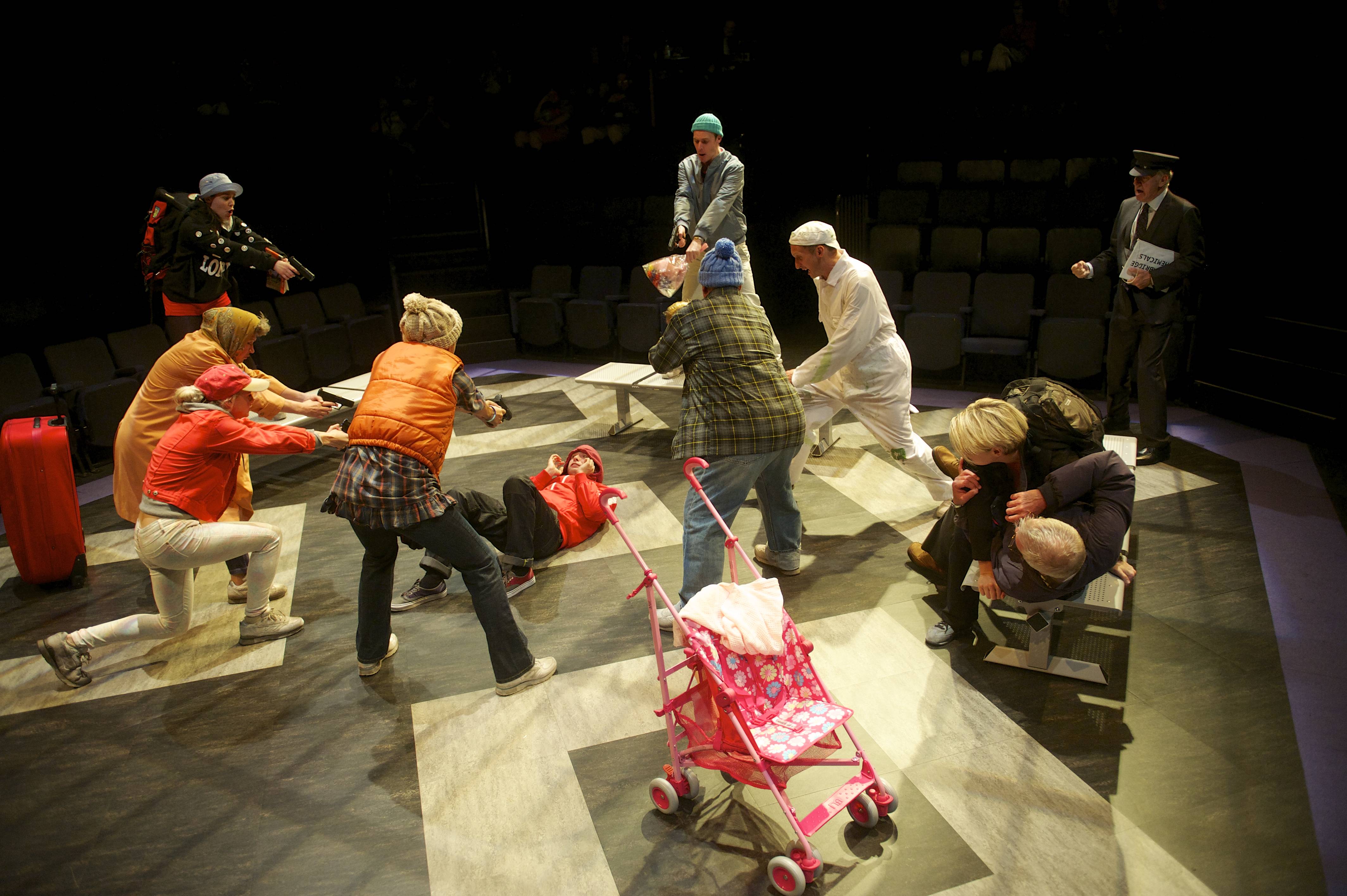Review: Arrivals and Departures
Described as ‘a Beckett-inspired tale of terrorism,’ Arrivals and Departures makes its world premiere on the Ayckbourn Ensemble tour this year, spending a few days at Warwick Arts Centre. Focusing on the brief, meaningless encounters between strangers, Sir Alan Ayckbourn has created a powerful and thought-provoking piece. The production poses questions about the way we as a society interact with each other and make snap judgments based on appearances. The play shows us that people are deep, complex creatures that cannot be fathomed just with a glance
Arrivals and Departures never technically departs from the train platform that is its present setting. Scenes and characters, flashbacks of time gone by, appear onstage and disappear like memories flashing across the internal vision. The SSDO Unit (Strategic Simulated Distractional Operations) is poised for the arrival and capture of a renowned terrorist at the platform. Amidst the bustle and clamour of the operation, we focus on traffic warden and civilian witness Barry Hawkins, and troubled soldier Ez Swain.
Through flashbacks, we discover that there is a lot more to the two unlikely companions than meets the eye. The irrepressible energy and positivity of the goofy Yorkshireman Barry and the secretive, silent Ez, make for two thoroughly emotive performances from Kim Wall and Elizabeth Boag, respectively. Playing on stereotypes, we see Barry as that stranger that everyone has met at some point during their lives. The stranger that will persist with rapid monologues despite all indications of social rejection.
Ayckbourn approaches class, age and gender concerns and tensions at their most extreme. The flashbacks slowly extend and expand, filling in the gaps that the characters fail to reveal to each other in their conversation, and ultimately conclude with emotional climaxes for both characters. The past influences the present through memory and thought played out onstage concurrently with the present action. From the comical, the photographic and the brief surface reality, we are taken down deeper into the characters’ histories and psychologies into the serious, the emotional, and the revealing.
Rather than playing to the audience’s own snap judgments and propensity to stereotype, we are shown the back-stories of Barry and Ez in their own memories that haunt them onstage. Discussing the production in a talk earlier that evening, Ayckbourn himself criticised the way in which society ‘shortcuts’ people, as a general tendency.
[pullquote style=”left” quote=”dark”]There is a lot more to the two unlikely companions than meets the eye.[/pullquote] We are never shown domestic scenes, only scenes of arrival and departure that reflect the nature of the present space as itself a transitional space. We see the two main characters in train stations, airports, service stations, and at the arrival or departure of key people in their lives. Rather than the private sphere, we see what the public can see. Public displays of the private issues that occur throughout the characters’ lives allow us to view their meetings in public spaces. Their private lives behind closed doors are easy to deduce by joining up the dots and paying close attention.
The first half did take a while to find its stride and the humour may have been a bit more suited to my parents’ and grandparents’ generation but once the play digs deeper into the personal histories and motivations of its characters, all falls into place and you are hooked. Arrivals and Departures is a thoroughly enjoyable and at times quite humorous production. However, more than anything, it is a fascinating insight into the brief encounters of strangers, snap judgments that we make every single day about people we meet and see, and a great experiment with the presentation of time in the theatre.

Comments